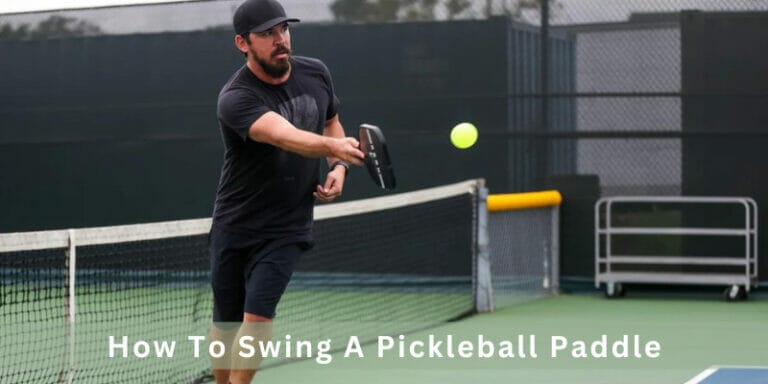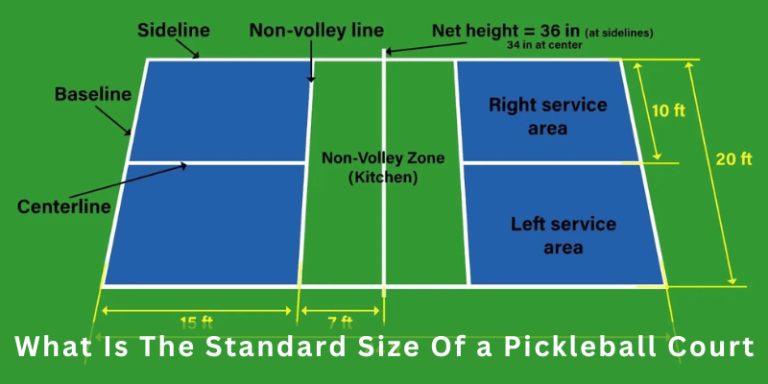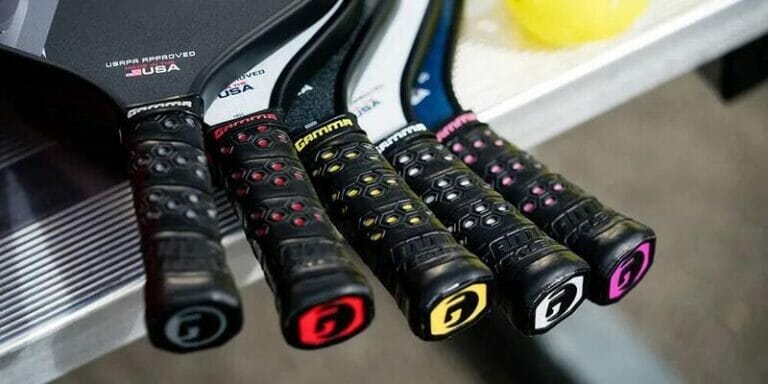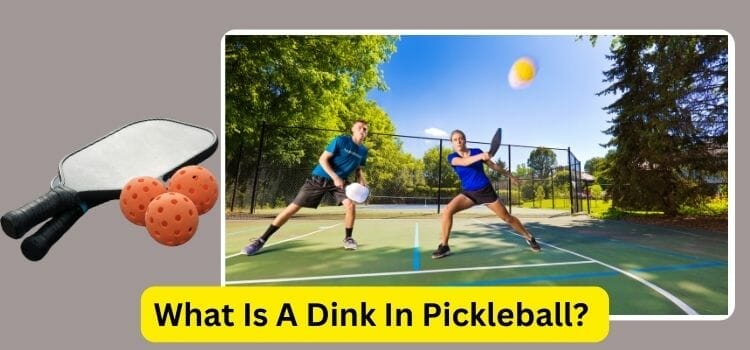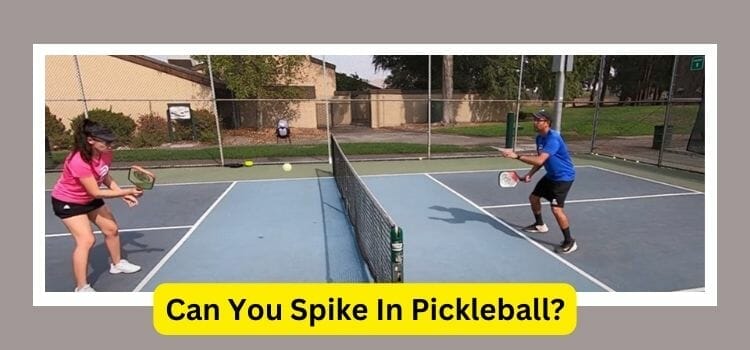Can Pickleball Paddles Get Wet? Discover The Aquatic Secret!
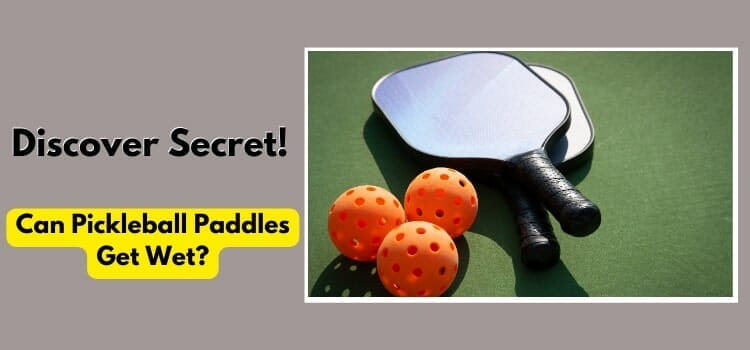
Dive into the world of pickleball, where paddles and balls take center stage in an exciting game that’s sweeping the nation. But wait…can these beloved paddles withstand a little aquatic adventure? Can pickleball paddles get wet?
The answer is Absolute! Pickleball paddles can get wet but don’t fret. Just remember it all comes down to how the paddle is designed and constructed. For the most part, pickleball paddles are not intended to get wet, but there are a few models that are specially made to be water-resistant.
Today, we’re here to unravel the aquatic secret and uncover whether it’s safe to splash around with your paddle or if you should keep it high and dry. Get ready for a deep dive into all things wet and wild in the world of pickleball!
Can Pickleball Paddles Get Wet:
Yes, Pickleball paddles can get wet due to playing in damp or rainy conditions, accidental water exposure, or improper storage. Most paddles are designed to be water-resistant and can handle brief exposures, but non-water-resistant paddles may get wet.
You see, pickleball paddles are typically made from materials such as wood or composite materials like graphite or fiberglass. These materials are chosen for their durability and resistance to wear and tear. While they may not be completely waterproof, they are designed to hold up well even in damp conditions.
Pros And Cons Of Getting A Wet Paddle
When it comes to pickleball, getting your paddle wet is not always avoidable. Whether you’re playing in the rain or accidentally drop your paddle into a puddle, water, and moisture can find their way onto your beloved equipment. While some players may see this as a disadvantage, there are actually pros and cons to having a wet pickleball paddle.
Here are some pros and cons of getting a wet paddle:
Pros:
- A wet paddle can provide more grip, which can be helpful for players who have sweaty hands.
- A wet paddle can also help to reduce vibration, which can be helpful for players who experience arm fatigue.
- A wet paddle can also help to keep the paddle cool, which can be helpful in hot weather.
Cons:
- A wet paddle can be more difficult to control, as the water can make the paddle slippery.
- A wet paddle can also be more likely to warp or crack, especially if it is made of wood or composite materials.
- A wet paddle can also be more difficult to dry, which can lead to the growth of mold or mildew.
There are both pros and cons to getting a wet paddle. Whether or not it is worth the risk depends on the individual player’s preferences and playing conditions.
Can You Play Pickleball In The Rain?
yes, you can indeed play pickleball in the rain! However, there are a few things to consider before grabbing your paddle and heading out onto the court.
Playing pickleball in the rain has its pros and cons. On one hand, it can add an exciting element of challenge to your game as the wet conditions make the ball bounce differently and require adjustments in strategy. It can also provide a refreshing change of pace and keep players cool on hot summer days.
On the other hand, playing in wet conditions does come with some drawbacks. Rain-soaked courts can become slippery, increasing the risk of slips and falls. Wet paddles may also have reduced grip on both the handle and face, affecting shot accuracy and power.
it’s up to each individual player to decide whether playing in the rain is worth the risks. If you’re comfortable with the potential consequences, go ahead and give it a try! However, be prepared for a wet, slippery experience and make sure to bring appropriate gear, including a water-resistant ball and appropriate shoes.
Will Rain Damage A Pickleball Paddle?
Yes, rain can damage a pickleball paddle. Most pickleball paddles are made of composite materials, which can be damaged by water. If your paddle gets wet, it is important to dry it off as soon as possible.
When it comes to rain, there is a possibility that it can cause damage to your paddle. The moisture from the rain can seep into the paddle’s core or handle and potentially weaken its structure over time. If not properly dried, this could lead to warping or delamination of the paddle’s surface.
if your paddle has any metal components such as screws or edges, prolonged exposure to rainwater may cause rusting or corrosion. This not only affects the performance of your paddle but also shortens its lifespan.
Investing in paddle covers and practicing proper storage techniques can offer an extra layer of protection against water damage, ensuring your equipment remains in optimal condition for continued gameplay enjoyment.
Issues With Playing Pickleball In The Rain
Playing pickleball in the rain can be a thrilling and adventurous experience, but it also comes with its fair share of challenges.
Let’s explore some of the common issues that arise when taking on the rain-soaked court:
Slippery Court
One of the biggest issues with playing pickleball in the rain is that the court can become slippery. This can increase the risk of falls and injuries, especially if you are not wearing shoes with good traction.
Visibility Issues
The issue is visibility. Rain can impair your vision, making it harder to see where the ball is going or judge its trajectory accurately. This can result in missed shots or misjudged hits, affecting your overall performance during gameplay.
Wet Paddle
The paddle can also become wet and slippery, making it more difficult to control. This can affect your accuracy and power, and it can also make it more difficult to grip the paddle.
Different Ball Bounce
The ball may also bounce differently in the rain, making it more difficult to hit. This is because the water can make the ball heavier and more aerodynamic.
Despite the challenges, playing pickleball in the rain can offer a unique and exciting experience for some players. Embrace the unpredictability, and remember to prioritize safety and adaptability to make the most of your rainy-day pickleball adventures!
Tips For Playing Pickleball In The Rain
When it comes to playing pickleball in the rain, there are a few key tips that can help enhance your experience and keep you safe on the court.
- Wear Proper Footwear: Choose shoes with excellent traction to prevent slipping on the wet court surface.
- Use a Waterproof Bag or Cover: Protect your equipment from moisture by using a waterproof bag or cover for paddles and balls..
- Adjust Your Playing Style: Be prepared to adjust your playing style and shots due to altered game dynamics in wet conditions.
- Improve Your Ball Grip: Use a towel or grip-enhancing product to enhance your grip on the ball.
- Stay Focused and Flexible: Embrace the unpredictability of playing in the rain and stay focused on the game.
- Prioritize Safety: Above all, prioritize safety during wet pickleball matches and consider postponing the game in heavy rain or moving to an indoor court if available.
By following these tips, you’ll be better prepared to enjoy a game of pickleball even when it’s raining outside!
Drying Techniques For Wet Paddles
After a rainy pickleball match or an accidental drop in a puddle, it’s important to properly dry your paddle to prevent any long-term damage. Here are some effective techniques for drying wet paddles.
1. Use a clean towel or cloth to wipe off any excess moisture from the surface of the paddle. Gently pat and rub the paddle until it feels mostly dry. This will help you clean the pickleball paddle effectively
2. You can use a hairdryer on a low heat setting to further remove any remaining moisture. Keep the dryer at least 6 inches away from the paddle and move it in circular motions to evenly distribute the warm air.
3. Another option is using an absorbent material like silica gel or rice. Place your wet paddle into a bag with one of these materials and seal it tightly. The absorbent material will help draw out the moisture over time.
By following these simple drying techniques, you’ll be able to keep your pickleball paddles in great condition even after getting them wet during gameplay.
Expert Insights: What the Pros Say
When it comes to pickleball, there’s no shortage of opinions from the pros. We reached out to some seasoned players and asked them about their experiences with wet paddles.
One pro, Anna Leigh Waters, emphasized the importance of keeping your paddle dry as much as possible. She explained that moisture can seep into the paddle’s core and affect its performance over time.
Another expert player, Ben Johns, shared a different perspective. He mentioned that while getting your paddle wet occasionally may not be detrimental, it’s essential to dry it thoroughly afterward.
While expert insights provide valuable guidance, ultimately it boils down to personal preference and how you want your equipment to perform on the court.
Remember – always consider these expert insights alongside your own experience and comfort level when deciding whether or not pickleball paddles can get wet!
Conclusion
Pickleball paddles can indeed get wet. While there are both pros and cons to getting your paddle wet, it is important to consider the potential damage that water can cause. Rain can be particularly problematic for pickleball players, as it not only affects the performance of the ball but also poses risks such as slippery surfaces and decreased visibility.
Playing in the rain may offer a unique experience for some players who enjoy the challenge and thrill of unpredictable conditions. However, it is essential to take precautions when playing in wet weather to ensure both your safety and the longevity of your equipment.
As you navigate the world of pickleball, remember that it all comes down to finding the right balance between risk and reward. Taking care of your paddle and making informed decisions will ensure you get the most out of your pickleball experience, whether rain or shine!
References:
FAQS
Q. Can you play on a wet padel court?
A. Yes, you can play on a wet pickleball court, but it’s important to exercise caution. Wet courts can become slippery, increasing the risk of falls and injuries.
Q. Is paddle indoor or outdoor?
A. Paddles are versatile for both indoor and outdoor play. Choose one suitable for your preferred court type.
Q. Are pickleball paddles water-resistant?
A. Most pickleball paddles are designed to be water-resistant and can handle brief exposures to water without significant negative effects.

